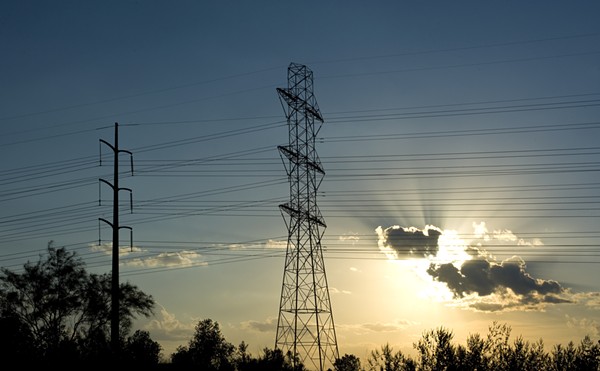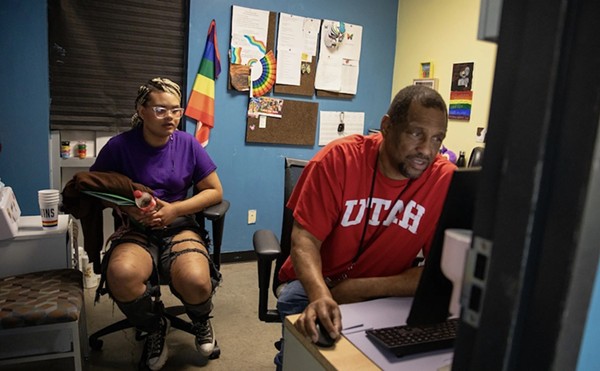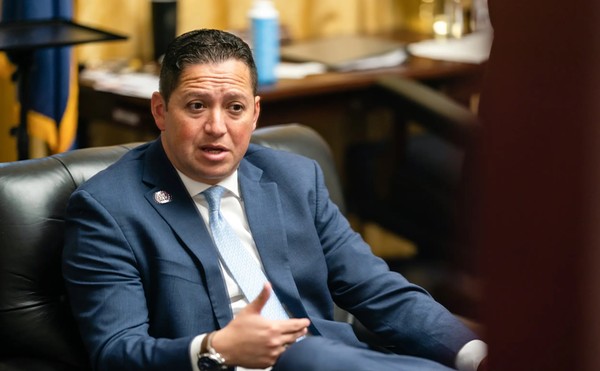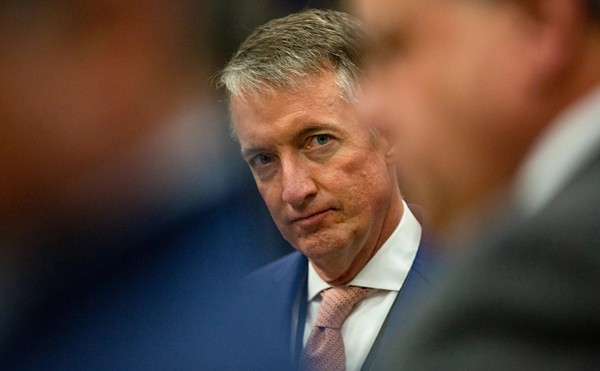There is a scene from an old "Twilight Zone" in which a futuristic earth has become as hot as a convection oven: The power grid has failed due to voracious energy demand; people, stripped to their slips and underwear, are killing each other over water; and the mercury is exploding out of its glass thermometer.
Apocalyptic, yes, but not as far-fetched as it might sound, especially in Texas, where many scientists project that in the next 100 years global warming could increase the summer temperature up 7 degrees, raise coastal sea levels, aggravate the number of heat- and pollution-related deaths, and deplete the supply of fresh water.
Texas has itself to blame, as the Lone Star State produces nearly twice as much carbon dioxide as any other state, more than 10 percent of the U.S. total. Due to the state's reliance on fossil fuels, such as coal, Texas spews as much CO2 into the air as the United Kingdom or Italy; if Texas had remained its own country, it would rank seventh in the world in greenhouse gas emissions.
A new global warming report by the Texas Natural Resource Conservation Commission was supposed to begin reversing the damage by collecting data on the polluters, then passing and enforcing regulations to cut the greenhouse gas emissions.
Unfortunately, the 200-page report wouldn't pass muster at a high school science fair: It is missing large chunks of data - including, reportedly at the behest of the governor's office, the names of the state's worst greenhouse gas polluters. It doesn't require any cuts in emissions, sets no emission limits, and postpones indefinitely any plans to determine how much greenhouse gas Texas companies are spewing into the air. The agency's recommendations to curb emissions - encouraging telecommuting, for example - are impotent and unenforceable.
"They made recommendations with one eye blind," remarked Tim Morstadt of the Texas chapter of Public Citizen, a non-profit consumer advocacy group. "The bottom line is they made every effort to not say anything."
The TNRCC's pseudo-report has serious implications for Texas' environmental and public health. Short-term, the polluters will keep polluting, the air quality will continue to deteriorate, asthma likely will still be the most prevalent chronic disease in children. Long-term, the ramifications are more dire.
Much Ado About Nothing
In July 2000, several environmental groups petitioned the TNRCC to get a handle on the state's greenhouse gas emissions. To accomplish this, the TNRCC sought help from the Environmental Protection Agency, who subcontracted part of the work to a Virginia-based consultant, IFC; its job was to estimate the greenhouse gas emissions. Four TNRCC staff members compiled the rest of the report, which took a year to complete, and was released to the commissioners on January 17. The report became available on-line (www.tnrcc.state.tx.us) to the public January 14.
But the TNRCC failed to accomplish its mission. Since the TNRCC doesn't require companies - except for utilities - to report their greenhouse gas emissions, the state's databases are so void of information, that consultants could estimate only about half of the emissions. Fossil fuels, the report revealed, comprise 85 percent of Texas greenhouse gases, but pinpointing the sources - cars, coal-burning plants, oil refineries - was beyond the TNRCC's scope. Without an accurate inventory of polluters and pollution, the TNRCC couldn't speculate on the amount of emissions reductions. The TNRCC held only perfunctory conversations with state agencies about global warming; nor did it extensively consult with university scientists, who are listed in the report.
The report does include pages of fancy charts, photocopies of scientific articles, and lists of energy-related legislation and community projects, such as Solar San Antonio's alternative energy symposium.
Even the TNRCC acknowledges the report's shortcomings, stating that "more complete information would be available if collections of actual emissions were required." Yet Project Manager Lynn Weber passed the responsibility to the agency's commissioners: "We're not trying to avoid it `naming polluters`, but we had no direction to collect that information," Weber said, adding that although data was missing, "We were told to do the best we could."
Under the Texas Clean Air Act, the TNRCC has the authority to require companies to report their greenhouse gas emissions. The TNRCC also has the power to collect that data, list it in a state-wide inventory, and regulate the amount of emissions in the air.
But the TNRCC didn't exercise that power, apparently at the request of Governor Rick Perry's aides, the TNRCC commissioners, and the strong business lobby. The Dallas Morning News reported in late January that the TNRCC was ready to release a formal inventory of the state's big polluters, but Perry's aides leaned on the agency, who were feeling the heat from the business community, to withhold that information.
As to whether the TNRCC is withholding information, a spokesman for Perry's office replied, "Address the TNRCC; this is their report."
Morstad noted that in light of the Enron scandal, the state should be forthcoming with the polluters' names. "That the industrial and chemical plants don't have to report is very troubling. We want to know where the pollution is coming from. The governor's office is covering for his contributors."
In fact, the very industries that would've come under scrutiny had they been named in the report - energy companies - are those who donated large sums to Perry's 2000 gubernatorial campaign. According to the Center for Responsive Politics, Perry received $960,000 from energy and natural resource companies, $665,000 from oil and gas interests, and $129,000 from the chemical and related manufacturing industries.
In an interview with the Current, a governor's spokesman denied allegations that Perry didn't want polluters' names revealed, adding that the governor wanted to wait for the federal government to act before the state conducted its own inventory. "We requested no specific language," the spokesman said. "We asked for the report to minimize bureaucracy and red tape, and to be based on sound science."
Sound science the TNRCC report is not. It contains woeful gaps in data, and its recommendations - based on incomplete information - are suspect. Dr. Camille Parmesan, a UT biologist who is named on the report's expert list, wrote in an email that, "external reviews are mandatory with any serious report. I suspect the TNRCC omitted this critical step. That report has little support within the scientific community without that step."
Parmesan's hunch is correct. The TNRCC did not seek any scientific review of the report before releasing it to the public and putting it to the commissioners for a vote.
And while the report contains a list of more than 30 Texas scientists, the TNRCC asked for little input from any of them. Of the 28 experts contacted, 14 replied to the Current. Only one, Evan Siemann of Rice University, contributed any findings to the TNRCC, and apparently the agency's quest for information was tentative at best. The other 13 scientists said they had little or no dialogue with the TNRCC, nor were they asked to provide written comments. Many didn't even know the report had been released.
Perry's rationale that the state should wait for the federal government to initiate greenhouse gas policy echoed the sentiments of Mary Miska, lobbyist for the Texas Association of Business and the Chamber of Commerce. The Dallas Morning News quoted Miska as saying, "It's futile and probably unproductive for Texas to take a position on global warming when it's a national and global problem." She added that the federal government should take the lead in solving the problem: "I don't think we should start in Texas."
Perry and Miska's comments make the TNRCC's Lynn Weber sounds mysteriously familiar: "The issue of climate change is a global one and certainly not appropriate at the local level."
But the state's position contradicts the EPA, which claims the federal government is looking to the states for leadership. Twenty-five states and Puerto Rico are developing climate change action plans; 19 have completed them. Texas doesn't have a plan, even though the EPA encourages state agencies to develop a greenhouse gas inventory and to project emissions, and to identify where reductions need to occur.
In an EPA guidance report, the agency notes that "state and local governments may be vulnerable to potential impacts of climate change and have a stake in reducing greenhouse gas emissions," calling states contributors to national emissions levels and "laboratories of greenhouse gas mitigation."
Under the Bush administration, the states shouldn't hold their breath waiting for the feds to develop a responsible energy plan. The national energy plan, devised in secret by the administration and industry (including Enron), has already gutted the nation's Clean Air Act by allowing refineries and other industrial plants to increase their emissions without modernizing their pollution controls. Bush's proposal to develop fuel cell cars - still a decade away - was a trade-off with the auto industry, so that new vehicles wouldn't be held to higher standards of fuel efficiency.
As one of the world's largest greenhouse gas polluters, Texas has the global responsibility to reduce its spew. Unfortunately, the TNRCC, which is endowed with that task, has only thrown up a smog screen in the form of a report that accomplishes nothing and says even less. •


















